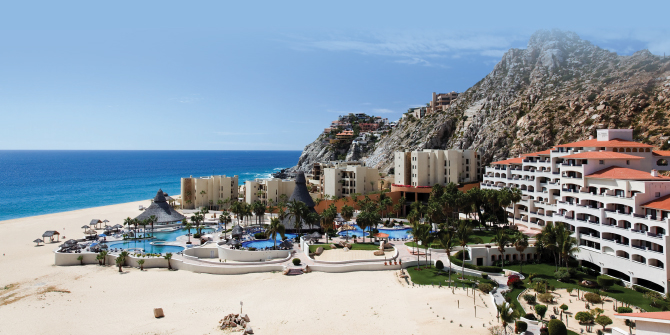
Investing in Mexico
The Safe and Legal Way to Buy a Second Home South of the Border
By Karie J. Boyd, Attorney and CEO
 Buying a second home in Mexico, whether as a vacation home or possibly a future retirement home, is a good way to experience a new culture and can offer a good value for the investment. Land costs can be lower and the cost of ownership is usually lower than the comparable expenses in the United States or Europe (utilities, property taxes, maintenance). You are not required to be a resident of Mexico to own real estate in Mexico, so a residency permit is not necessary or required.
Buying a second home in Mexico, whether as a vacation home or possibly a future retirement home, is a good way to experience a new culture and can offer a good value for the investment. Land costs can be lower and the cost of ownership is usually lower than the comparable expenses in the United States or Europe (utilities, property taxes, maintenance). You are not required to be a resident of Mexico to own real estate in Mexico, so a residency permit is not necessary or required.
As with real estate purchases anywhere, there have been stories of purchases gone wrong, but when the correct processes are followed, the real estate purchase usually happens smoothly and legally.
If you’re considering the purchase of property in Mexico, you will need to research the area where you are looking to purchase, carefully select your location and property, hire the right professionals to assist you with the purchase process, and follow the “letter of the law” in regards to the legal transfer of ownership.
Mexican law now allows for the purchase of real estate by non-Mexican citizens, including U.S. citizens, although there are certain areas where there are restrictions on how title may be held, specifically in the 100 km land border zone and in the 50 km coastal zone. Outside of these two areas, non-Mexican citizens may take title outright. Inside of these zones, non-Mexican citizens are required to hold title through a land trust (called a fideicomiso) which is arranged through a bank. The trust holds the deeds to the property, and you or any other named persons (as you specify) are sole beneficiaries to the trust. You have full rights to do whatever you like with your property. You can develop the property (in accordance with local planning regulations), rent it, lease it, sell or give it away. Essentially, you own the property in all but name. The land trust enables you to name a beneficiary upon your death, and you do not need to have a will or estate plan prepared in Mexico to specify your post-death wishes (just as with a trust in the United States). The initial term of the fideicomiso will be for 50 years, but don’t worry, it can be renewed in the last year for an additional 50 years and this process can be continued indefinitely, providing for long term control of the asset.
The most important person you will deal with in purchasing real estate in Mexico is your Notary Public. Mexican Notaries Public should never be confused with their U.S. counterparts – they are very different in both qualifications and job descriptions. In the U.S., almost anyone can become a Notary Public. The same is not true in Mexico, where Notaries Public are appointed directly by the governor of the state where they are located. The Notary Public has the power to witness and certify important business documents which require authentication. The Notary Public is also required to manage and securely store original records. To become a Notary Public in Mexico, the applicant must be a Mexican citizen, be at least 35 years old, have a law degree, have worked for three years in a Notary Public office, and then pass a stringent exam. Those who pass can be appointed as a Notary Public by the state governor.
Under Mexican Law, the Notary Public is required to prepare the deed to the real property. As a buyer, it is your right to choose the Notary Public, and this should be your first step (or second, if you choose to also retain an attorney). The Notary Public ensures all documentation and permits are in order so that the real estate transaction will move forward smoothly.
The Basic Process:
1. Find a property you like and verbally agree on a sales price;
2. Your Notary Public will prepare a detailed written agreement including all costs, inclusions and exclusions, and any deadlines, using what is called a “Convenio de Compra/Venta” (provisional sale agreement). A ‘good faith’ deposit (5-10%) is paid by the buyer with a negotiated cancellation penalty should either party cancel the transaction;
3. If the property is inside the 50/100km coastal/border zone, you will need to set up a property trust (the Notary Public or bank can assist with this); if the property is not within this zone, the trust is not required (but remains optional for buyers who wish to use one);
4. Get permission from the Foreign Secretary’s office (a formality) to buy the land. You will be asked to sign the “Calvo Clause,” which states that you will not seek foreign jurisdiction in dealings with your property transaction;
5. If you are buying from a real estate developer, advise the Notary Public who will ensure the developer’s permits are in order;
6. The seller must provide a copy of the land/property deeds. The Notary Public will review these and check that the land is not ejido (or common agricultural) land;
7. The Notary Public will then arrange for an official appraisal of the land (called an Avaluo);
8. The Notary Public (or your Mexican attorney) will ask you for your official documents that usually include your passport, a certified copy of your birth certificate, a certified copy of your marriage certificate (if you are married), and your visa (which may be a tourist permit) to prove that your stay in Mexico is legal;
9. The seller needs to present to the Notary Public their documents including the original property deed, receipts showing the property tax is current and paid, records showing that public utilities bills are paid and current, plus proof that land-service fees are paid;
10. The seller will pay the capital gains tax, unless you have agreed to pay this amount as part of the purchase agreement. The Notary Public will calculate the sum and tell you and the seller how much is owed;
11. The remaining purchase funds are paid at the time when the deed is signed over to you. This is done at the Notary Public’s office. The Notary Public and attorney fees (if you hired an attorney) are also paid at this time, along with the other taxes – acquisition tax, appraisal tax, and registry fees – associated with purchasing real property.
Felicidades (Congratulations)! Once this process is done, you will be the owner of real property in Mexico.
MORE INFO:
If you have a Trust as part of your estate plan, you should update it to reflect your ownership of international real estate, especially if your beneficiaries reside in the United States. Boyd Law APC can assist you with either updating an existing Trust or preparing a Trust if you do not have one already. Our skilled estate planning attorneys are familiar with how to include international property in a Trust.
Please contact our offices in Los Angeles at (310) 777-2031 or San Diego at (619) 232-1206 for more information.
The information you obtain from this article is not, nor is it intended to be, legal advice. The article is intended for entertainment purposes and the information published in this article may not be sufficient in dealing with your specific legal matter. Boyd Law is not licensed in Mexico. This article should not be relied upon as a substitute for independent research from original sources of authority.
